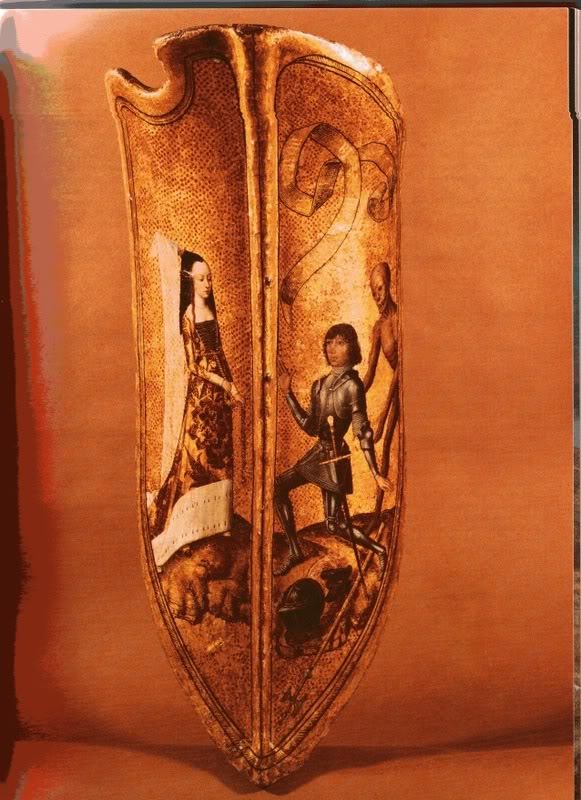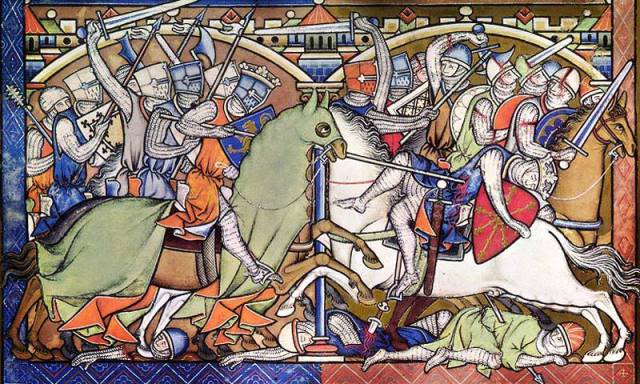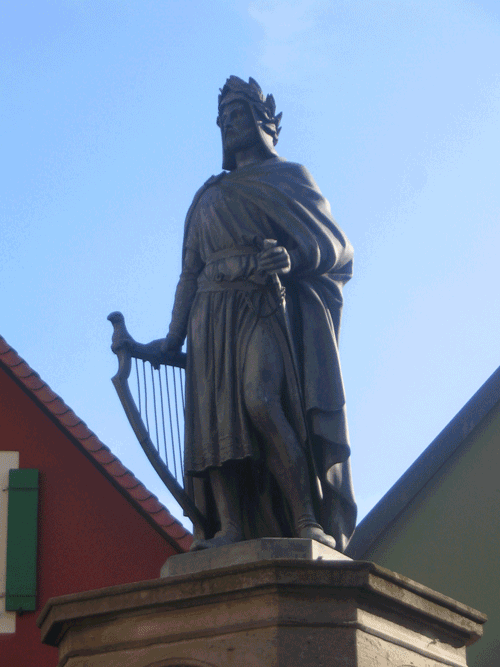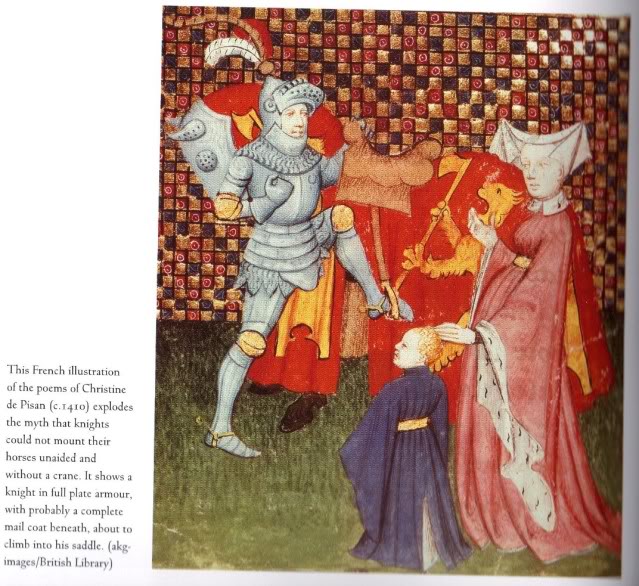| Author |
Message |
Craig Peters

|
 Posted: Fri 20 Aug, 2010 10:35 pm Post subject: The Quintessential Knight Posted: Fri 20 Aug, 2010 10:35 pm Post subject: The Quintessential Knight |
 |
|
Though we are united by a common interest in different forms of arms and armour, the various members of myArmoury are often interested in quite different time periods. Even those who are interested in the same broad historical era might prefer different centuries or decades within that era.
For those of you who are interested in the Middle Ages, what medieval illustration or illumination best captures the quintessential qualities of the medieval knight for you? What is it about the illustration that you feel makes it representative of knighthood?
Important note: This thread is not about historical knights who were exemplars of knighthood. It is about which medieval visual representation you feel best captures the characteristics of a knight.
Here are the rules:
1) The image or depiction must be medieval. No modern paintings or illustrations are allowed. Please include an attachment or a link to the image!
2) For the purpose of this thread, medieval will be counted as dating from 1000 CE to 1525 CE. Prior to the 11th century, while there are mounted horsemen who fought in battles, we really cannot call them "knights" in the conventional sense. They lacked the sense of Christian brotherhood that we first begin to see first appearing in the 11th C, and they lacked the intercohesiveness as a group that became more prominent among knights in the 12th C.
I wanted to end the period at 1500 CE, but I decided to extend it to 1525 in case people have a favourite image from an artist like Durer that fits a little bit outside of this time frame. Really though, the point is to find an image between the 11th and turn of the 16th C, while making an allowance for artwork that does not quite fit in perfectly to this time frame.
3) You are allowed images with more than one knight in them. If you feel that a depiction of battle from the Maciejowski Bible represents the quintessential knightly image, or perhaps an illustration from Froissart's Chroniques, by all means use them.
4) Explain why you feel the image is representative.
For me, the quintessential representation of a knight has to be the one found in the 13th C Matthew of Paris ms, probably best known to myArmoury members from Albion's webpage for the Next Gen. Chevalier sword:

The position of the knight, kneeling with his hands open in supplication, presents an idealized representation of Christian piety that we associate with knights from the High Middle Ages, even if reality was often a far-cry from the image. The illustration is a beautiful example of a knight being equipped for battle. He is dressed in mail, a sword hanging from his side, a lance cradled in his arm, while he awaits his great helm to complete his armament. His noble steed waits for him nearby. Finally, the lady in the tower (not visible in the Albion image) represents the courtly aspect of chivalry, but this image is a particularly medieval, rather than modern, expression of it. This is no helpless damsel in distress; this is a lady arming her knight for war. Of all the images of medieval knights, this one best captures the key elements of knighthood for me: Christian faith, knightly accoutrements, and chivalry.
What is your favourite illustration and why?
Last edited by Craig Peters on Mon 23 Aug, 2010 5:36 pm; edited 1 time in total
|
|
  |
 |
JE Sarge
Industry Professional

|
 Posted: Sat 21 Aug, 2010 1:33 am Post subject: Posted: Sat 21 Aug, 2010 1:33 am Post subject: |
 |
|
Albrecht Dürer - Knight, Death, and the Devil (1513)

Though a later image by your standards, I feel that this image is representitive of the knight and his true enemies in the world. Sin, as represented by the devil and Death, as represented by well...Death. To me, this is the essence of bravery. He remains focused on the mission at hand, while ignoring both temptation and fear. There is no obvious form of hope in the picture, no form of immediate redemption or salvation from the Devil or Death, meaning that the knight could fall victim to either at any time. A warrior knows this, yet there is no option but to continue on your path to an uncertian future - the mission must be accomplished, no matter the threat at hand. He must, have strong faith to move forward, knowing that he is delivered on his journey, not by sheer courage, but also guided by the grace of God.
As a boy, this was the image I had of the knight when I read Le Morte d'Arthur and The Once and Future King. A much more romantic and historically-inaccurate visage than what I know now from the pages of real history. I now know that King Arthur did not exist in the modern context, the Knights of the Round Table did not wear plate, and Excalibur would have probably been a type of spatha instead of looking like Discerner. 
J.E. Sarge
Crusader Monk Sword Scabbards and Customizations
www.crusadermonk.com
"But lack of documentation, especially for such early times, is not to be considered as evidence of non-existance." - Ewart Oakeshott
Last edited by JE Sarge on Sat 21 Aug, 2010 1:48 pm; edited 1 time in total
|
|
  |
 |
|
Zac Evans
|
 Posted: Sat 21 Aug, 2010 2:39 am Post subject: Posted: Sat 21 Aug, 2010 2:39 am Post subject: |
 |
|
There are loads that I've seen that speak to me, but this is the one that did so most:

A parade shield, but beautifully painted and gilded, it appeals to my sense of the flamboyant, but it's the subject that really catches me. The writing in the parchment reads "vous ou la morte", translated as "you or death". To me it cuts to the heart of why most men do anything: for the approval of beautiful women.
|
|
  |
 |
|
Josh MacNeil
Location: Massachusetts, USA Joined: 23 Jul 2008
Posts: 197
|
 Posted: Sat 21 Aug, 2010 9:46 am Post subject: Posted: Sat 21 Aug, 2010 9:46 am Post subject: |
 |
|
|
JE beat me to it. Well said Mr. Sarge!!
|
|
   |
 |
|
J R Johnson
|
 Posted: Sat 21 Aug, 2010 11:59 am Post subject: Posted: Sat 21 Aug, 2010 11:59 am Post subject: |
 |
|

Knights in battle, from the Maciejowski Bible. Chivalry was the code of the day but it was mainly lip service. In reality, knights and nobles really only were chivalric toward those of a certain class and in battle, those who could pay ransom. Link to Maciejowski Bible: http://www.medievaltymes.com/courtyard/maciejowski_images_23.htm
Semper Paratus
|
|
 |
 |
Jared Smith

|
 Posted: Mon 23 Aug, 2010 4:04 pm Post subject: Posted: Mon 23 Aug, 2010 4:04 pm Post subject: |
 |
|
Wolfram Von Eschenbach......
Not much survives in terms of true 12th - 13th century period illustration of him, but accomplishments credited to him are somewhat amazing. Although he characterized himself as so poor that even a mouse starved in his home, he achieved recognition in the Manesse Codex, which few other of that station did. He is credited as belonging to a fairly small number of high medieval era authors that generated the public enthusiasm with knights, feasts of arms, tournaments, and fictional epics about them. He was both a true fighting knight, and a bard (minnesigner.) The Parzival work is over 20,000 lines long, and is fair to compete with just about any classic literary accomplishment, not mention several uniquely inventive styles within his works having been sited as sources of inspiration by a few 20th century Poet Nobel Laureates.
Also, his home town region produced the "bock" strength beers and remains one of the rare locations where weizenbock or double strength wheat beer is still made.
 Attachment: 102.42 KB Attachment: 102.42 KB

Absence of evidence is not necessarily evidence of absence!
|
|
  |
 |
Craig Peters

|
 Posted: Mon 23 Aug, 2010 5:33 pm Post subject: Posted: Mon 23 Aug, 2010 5:33 pm Post subject: |
 |
|
Jared (and other forum members who may not have seen this thread),
This thread isn't actually about historical knights whom you feel fit the description of the quintessential knight. Rather, it's about medieval images and depictions of knights. Which medieval image do you feel is the quintessential representation of the knight?
|
|
  |
 |
Bill Grandy
myArmoury Team


|
 Posted: Mon 23 Aug, 2010 7:07 pm Post subject: Posted: Mon 23 Aug, 2010 7:07 pm Post subject: |
 |
|
I like this idea for a topic, Craig.  And not only that, but I happen to share your opinion about the Matthew of Paris image, for pretty much the exact same reasons. And not only that, but I happen to share your opinion about the Matthew of Paris image, for pretty much the exact same reasons. 
These days I'm drawn more to the 15th century, but that particular image has always really grasped me ever since I was very young for its strong chivalric overtones.
HistoricalHandcrafts.com
-Inspired by History, Crafted by Hand
"For practice is better than artfulness. Your exercise can do well without artfulness, but artfulness is not much good without the exercise.” -anonymous 15th century fencing master, MS 3227a
|
|
   |
 |
Jared Smith

|
 Posted: Tue 24 Aug, 2010 4:46 pm Post subject: Posted: Tue 24 Aug, 2010 4:46 pm Post subject: |
 |
|
| Craig Peters wrote: | Jared (and other forum members who may not have seen this thread),
This thread isn't actually about historical knights whom you feel fit the description of the quintessential knight. Rather, it's about medieval images and depictions of knights. Which medieval image do you feel is the quintessential representation of the knight? |
I understand, respect this position, and still, consider this sculpture to be appropriate for my own specifically personal preferences. I count myself as something of an idealist. Realistically, he probably appeared better equipped in maturity, if the statue were intended to be in the context of battle. In the case of this sculpture, that I have admired for several years now, the modern statue conveys to me that that that particular knight did not start out with the luxury of good equipment provided by someone else, or automatically afforded through social status. The image depicts him as "modern guesses" would deduce many of this station and Germanic regions were initially equipped as poorer bondsmen knights; in a bear skin cloak with a basic sword. The "poor bondsman knight" was left to upgrade that gear from spoils of war. In all of the Hollywood and modern fictional "Arthurian Legend" re-works, most later period literature simply embellished folklore similar to the real life achievements of this individual and King Frederick Barbarossa. Perhaps that is why his own version of the legend stands out for all time as a literary and lyrical masterpiece.
Absence of evidence is not necessarily evidence of absence!
|
|
  |
 |
J.D. Crawford

|
 Posted: Tue 24 Aug, 2010 6:36 pm Post subject: Posted: Tue 24 Aug, 2010 6:36 pm Post subject: |
 |
|
'The Knights of Christ' by Jan Van Eyck.
It possibly represents the military orders. It's quite past my main period of interest, but there's something about it that seems to capture my image of the medieval knight. I think its the overall composition and their resolute expressions rather than the details of the armor and clothing.
|
|
   |
 |
Thom R.

|
 Posted: Tue 24 Aug, 2010 7:52 pm Post subject: Posted: Tue 24 Aug, 2010 7:52 pm Post subject: |
 |
|
There are surprisingly few representations of knightly individuals of the quality of the Matthew of Paris ms, and I think most of the truly iconic ones (with accurate armour) are reproduced in Edge and Paddock. we also had a thread on depictions of St. George and the dragon (in case you missed it) here:
http://www.myArmoury.com/talk/viewtopic.php?t...ght=george
I have always liked this image in addition to the ones already posted

|
|
  |
 |
Jean Henri Chandler

|
 Posted: Tue 24 Aug, 2010 8:42 pm Post subject: Posted: Tue 24 Aug, 2010 8:42 pm Post subject: |
 |
|
| Zac Evans wrote: | There are loads that I've seen that speak to me, but this is the one that did so most:

A parade shield, but beautifully painted and gilded, it appeals to my sense of the flamboyant, but it's the subject that really catches me. The writing in the parchment reads "vous ou la morte", translated as "you or death". To me it cuts to the heart of why most men do anything: for the approval of beautiful women. |
That is a real cool painting on that shield
J
Books and games on Medieval Europe Codex Integrum
Codex Guide to the Medieval Baltic Now available in print
|
|
  |
 |
|
|
You cannot post new topics in this forum
You cannot reply to topics in this forum
You cannot edit your posts in this forum
You cannot delete your posts in this forum
You cannot vote in polls in this forum
You cannot attach files in this forum
You can download files in this forum
|
All contents © Copyright 2003-2026 myArmoury.com — All rights reserved
Discussion forums powered by phpBB © The phpBB Group
Switch to the Basic Low-bandwidth Version of the forum
|

